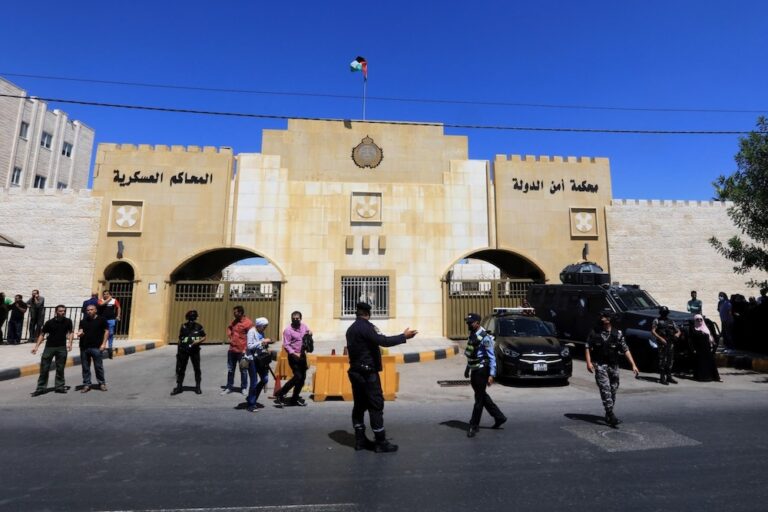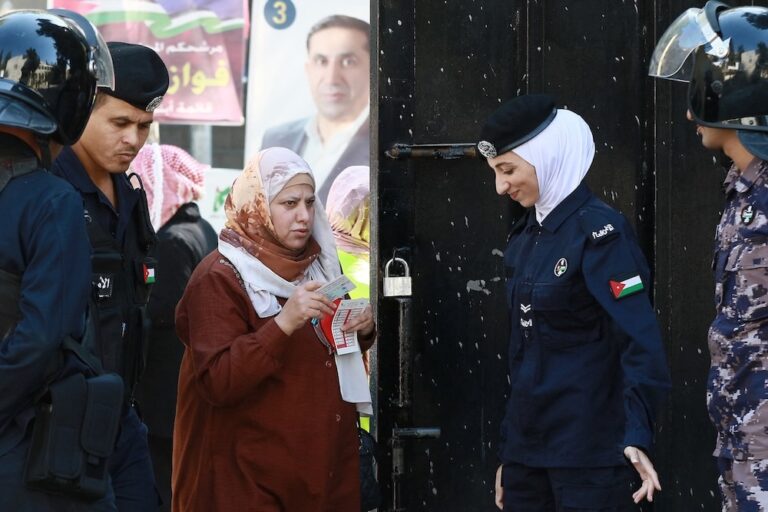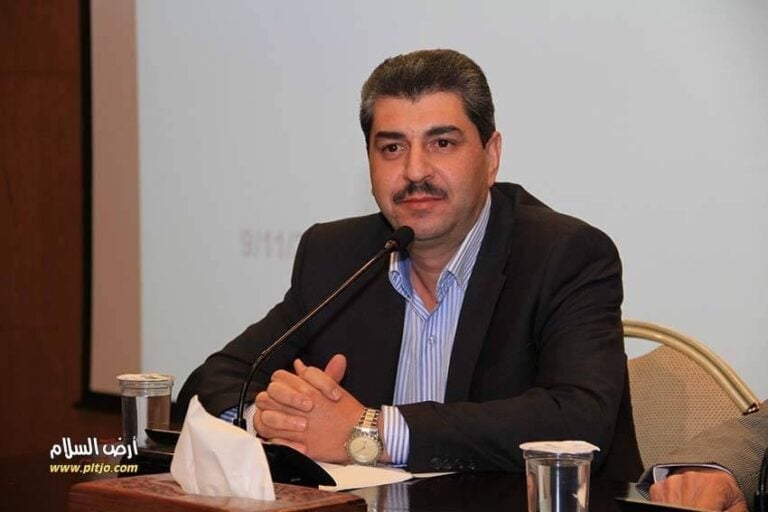(HRW/IFEX) – The parliamentary elections in Jordan on 4 November 1997 will be held in a climate of mounting restrictions on freedom of expression and association, Human Rights Watch charges in a report issued on 29 October. “A marked deterioration in respect for basic freedoms has seriously affected the ability of Jordanians to make informed […]
(HRW/IFEX) – The parliamentary elections in Jordan on 4 November
1997 will be held in a climate of mounting restrictions on
freedom of expression and association, Human Rights Watch charges
in a report issued on 29 October. “A marked deterioration in
respect for basic freedoms has seriously affected the ability of
Jordanians to make informed choices on election day,” said Hanny
Megally, executive director of the Middle East division of Human
Rights Watch. “It’s worrying when individuals are afraid to
engage in peaceful political activities or to even express their
views — because they may be arrested, face criminal prosecution,
or lose their jobs,” he added.
The 33-page report, entitled “Clamping Down on Critics: Human
Rights Violations in Advance of the Parliamentary Elections”,
documents government actions this year aimed at taming the print
media and intimidating political critics into silence. It
describes the impact of the restrictive and controversial
amendments to the press law, enacted in May 1997, and details how
political activists, students, writers and researchers have faced
a variety of sanctions – ranging from detention, criminal
prosecution and imprisonment to harassment, job loss and
blacklisting – because they expressed views on political subjects
that the government preferred remain off-limits. “Such measures
have created an atmosphere in which the right to free expression
is under siege,” Human Rights Watch says.
Sweeping content bans imposed on the press in May have affected
editorial decisions and journalists’ reporting and commentary on
a wide range of issues of importance to the public in the run-up
to the elections. It includes testimony from journalists and
editors who told Human Rights Watch that they have followed a
stricter regime of self-censorship since the press law amendments
were implemented, for fear of being subjected to hefty financial
penalties. The fines that may be imposed for violations of the
content bans – as high as US$ 35,000, and well beyond the
financial means of the majority of journalists in Jordan – are
clearly intended as a deterrent that will influence journalists
and editors in what they write and publish. The Ministry of
Information’s suspension of thirteen weekly newspapers on 23
September eliminated in one stroke an important source of
independent information and often hard-hitting political
criticism for voters.
Human Rights Watch also highlights the criminal prosecution of
individuals under the penal code for the peaceful expression of
their views, as “a particularly alarming development.” Article
195 of the penal code provides for prison terms of up to three
years for any form of expression that violates the dignity of
King Hussein. The use of Article 195 to prosecute prominent
government critics such as Laith Shubeilat, former member of
Parliament and head of the Jordanian Engineers Association, as
well as young writers and political activists, sends a signal
that divergent views will not be tolerated and casts a pall over
the right of all Jordanians to free expression, Human Rights
Watch charges.
The report also documents state restrictions on, and interference
in, the activities of both Islamist and secular figures in the
political opposition, political parties, professional
associations and other independent organizations. In 1997,
meetings and lectures have been banned, and independent critics
have been prevented from speaking before public audiences. In
addition, both opposition political parties and the politically
active professional associations have been threatened by
government ministers.
The Human Rights Watch report addresses a series of
recommendations to the government of Jordan, to the United States
of America, and to the European Union and its member states.
To the government of Jordan:
Abolish restrictions in law and practice on the right to freedom
of expression, orally, in writing and by other means, in accord
with international standards, so that no one is detained or
subjected to criminal prosecution for the exercise of this right.
Repeal the May 1997 law that amends provisions of the press and
publications law.
The regulation of the press and other media should comport with
Jordan’s obligation under international law to guarantee free
expression, so that restrictions on expression are specific and
narrowly defined, as required by international standards, so as
not to place in jeopardy the right of free expression itself.
All currently licensed weekly newspapers, including the thirteen
that were suspended in September 1997, should be allowed to
resume publishing immediately. The content bans, capitalization
requirements and fines of the 1993 and 1997 press law provisions
should be repealed, and in the interim their enforcement
suspended, and new legislation that comprehensively guarantees
freedom of the press and prohibits restrictions broader in scope
than those permitted by the International Covenant on Civil and
Political Rights (ICCPR) should be enacted.
Uphold the right of all individuals to freedom of association
with others, in consonance with international standards,
including the right to form and join professional associations.
Cease the harassment, intimidation and blacklisting of political
opponents of the government, including at work places and
universities.
Review provisions in the Jordanian penal code, including the lese
majeste provision of Article 195, and amend or repeal provisions
that are inconsistent with international human rights standards
with respect to freedom of expression. During the review process,
halt the prosecution of individuals under Article 195.
Cease interference with the right of political parties, and other
organizations or individuals, to advocate peacefully the boycott
of the upcoming elections, as long as such advocacy does not
involve efforts to coerce or threaten voters.
End restrictions on public meetings, lectures, discussions and
peaceful demonstration, and permit such activities to be carried
out by political parties, professional associations and others,
in accordance with international human rights standards with
respect to freedom of assembly.
To the United States:
The close political and military relationship between the U.S.
and the government of Jordan presents the opportunity for the
Clinton administration to address the human rights violations
detailed in this report. We therefore urge the administration to
criticize publicly the Jordanian government’s excessive
restrictions on Jordanian citizens’ exercise of the rights of
free expression, assembly and association, and in particular to:
Urge the government of Jordan to repeal the 1997 amendments to
the press and publications law.
Press the government of Jordan to amend Article 195 of the penal
code, which effectively criminalizes all criticism of King
Hussein, and to ensure that penal code provisions are consistent
with international standards.
Urge the government of Jordan to cease the harassment and
intimidation of persons simply for exercising their right to
criticize their government.
Urge the government of Jordan to end its arbitrary interference
in the exercise of the right of peaceful assembly and freedom of
association.
To the European Union and Member States:
Article 2 of the pending Euro-Mediterranean Association Agreement
between Jordan and the E.U., scheduled to be signed in late
November 1997, specifies that respect for human rights and
democratic principles are an “essential element” of the
agreement.
The E.U. Council of Ministers and the European Commission should
use the occasion of the signing of the agreement to urge the
government of Jordan to bring its laws and practices with regard
to the exercise of freedom of expression, freedom of peaceful
assembly and freedom of association into compliance with
international standards.
The European Parliament, prior to ratification of the Association
Agreement, should request that the commission issue a public
report regarding the state of Jordan’s compliance with these
international standards, and should use the ratification process
to secure specific and measurable Jordanian commitments to
address any deficiencies in that compliance.
The governments of the E.U. member states should use the process
of individual state ratification of the agreement to address
issues of Jordanian compliance with these standards, and should
make ratification contingent on a clearly stated understanding
that recurrent violations of these standards in the future will
have consequences with regard to the economic provisions of the
agreement.


